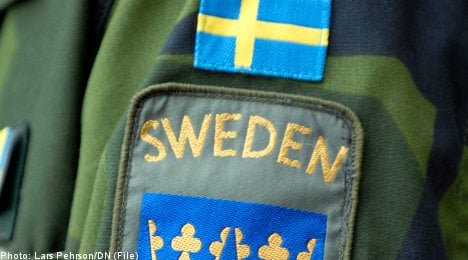“I’ve worked training Swedish officers and soldiers so they would be ready when they come to Afghanistan and help the Afghan people,” 30-year-old Sam Amin told TV4.
At the same time as he was working for the Swedish Armed Forces (Försvarsmakten), Amin was also being sought by police who were attempting to carry out a deportation order issued by the Swedish Migration Board (Migrationsverket), according to TV4.
Amin was one of roughly 60 Afghans who worked as extras in Swedish military training exercises to make them more realistic. The exercises took place several weeks ago with the Life Guards regiment (Livgardet) north of Stockholm.
In addition to Amin, roughly of the 40 Afghans employed by the Swedish military lacked Swedish citizenship, a violation of Armed Forces guidelines from January of this year which stipulate that only people with Swedish citizenship can be employed for military exercises.
“I’d estimate that about 20 to 25 actually had passports,” Afghan asylum seeker Abdul Nabi Komaki told TV 4.
In addition, many of the participants in the exercise lack Swedish work permits.
The revelations prompted defence minister Sten Tolgfors to issue a statement ordering the Armed Forces to appear at the ministry and “explain the circumstances of these cases”.
Life Guards regiment spokesperson Katja Öberg Lundgren confirmed for the TT news agency that Afghans who lacked Swedish citizenship participated in the training.
“We haven’t performed background checks on everyone. Our procedures were lacking, quite simply,” she said.
“The measures we adopted [following the introduction of the new guidelines in Januaray] didn’t manage to come into effect to their full extent.”
According to Öberg Lundgren, most of the Afghan refugees who participated in the training served as extras.
“Most of them played the part of village elders, police officers, or merchants. They also served as crowds to give the soldiers as good an insight as possible into what they can look like,” she said.
Armed Forces headquarters has refused to comment on the matter, placing responsibility for the oversight entirely on the Life Guards Regiment.
The Life Guards Regiment is based in the north Stockholm suburb of Kungsängen and is tasked with training Swedish officers and soldiers for international assignments. It also provides training for national service and Home Guard personnel.
The regiment is also home to the Swedish Armed Forces International Centre, SWEDINT, which organises courses peace support operations and multinational staff procedures within the framework of the UN and NATO/PfP (Partnership for Peace).



 Please whitelist us to continue reading.
Please whitelist us to continue reading.
Member comments